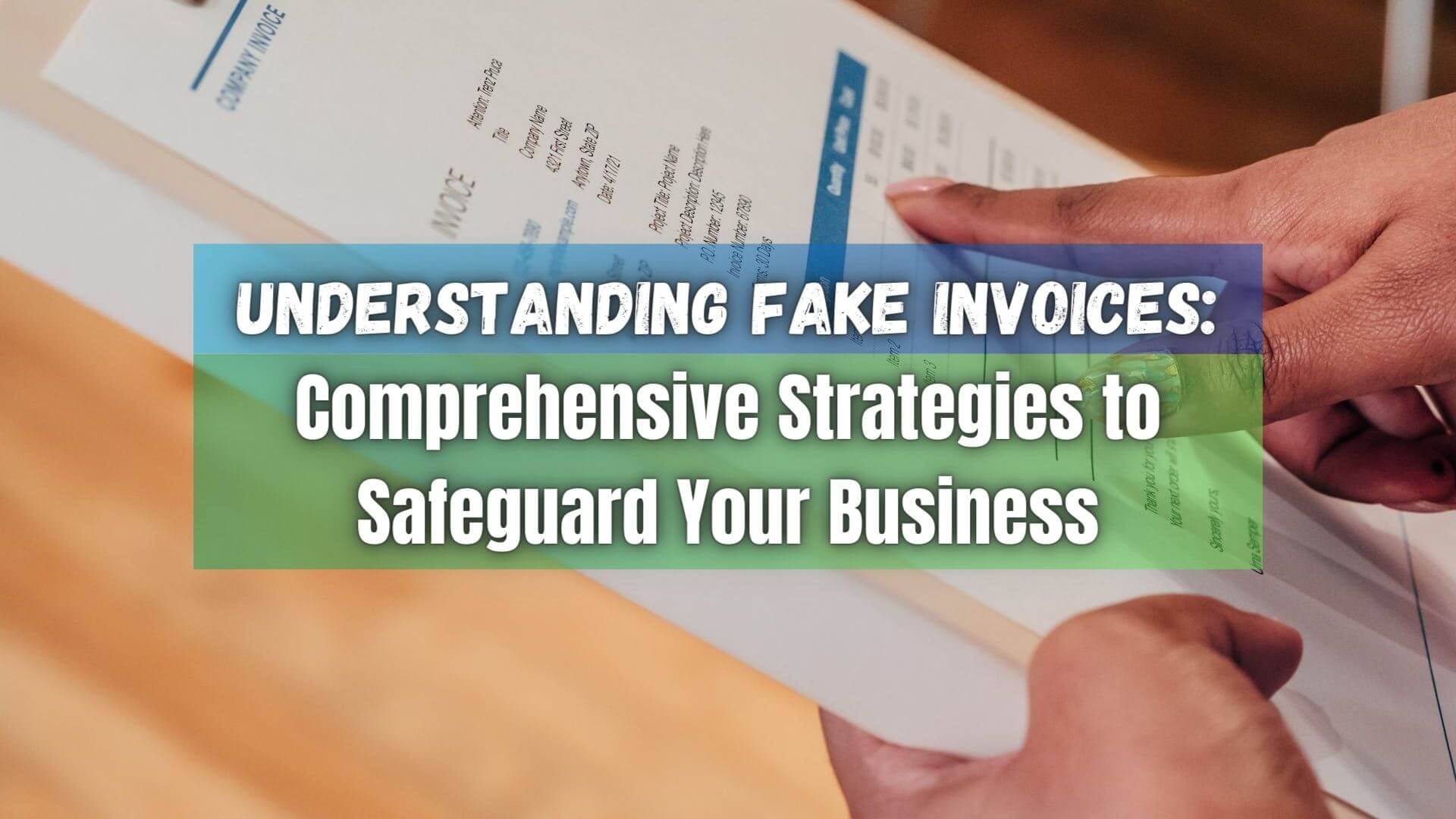In the intricate web of business transactions, an increasingly common and harmful thread is woven— fake invoices. As the name hints, a fake invoice is a fraudulent bill, unsanctioned by legal frameworks, and often called a ghost or phantom invoice. The process of sending these fabricated invoices, or invoice fraud, is a rising threat to businesses worldwide.
These misleading documents demand payment for goods or services never rendered or, in some cases, inflate the payment required for actual services. The frequency and sophistication of this scam are alarming, underscoring the critical need for businesses to arm themselves against such fraud.
This article will equip you with a comprehensive understanding of fake invoices and practical strategies to safeguard your business against this insidious threat. The strategies will range from preventive measures to reactive tactics to limit damage, ultimately fortifying your business against the invasion of phantom invoices.
Table of Contents
ToggleThe Anatomy of Fake Invoices
To fully comprehend the threat of fake invoices, it’s essential to understand their anatomy. The form and structure of these deceitful documents can vary greatly, making them difficult to identify. However, they often share common characteristics that can serve as red flags.
Common Characteristics of Fake Invoices
Despite their diverse manifestations, fake invoices exhibit certain features that can alert a vigilant eye. While not universally present, these traits are generally good indicators of a potential fraudulent document.
- Falsified Information: Fake invoices often contain false information, such as incorrect company details or bank accounts, or they may list products or services that were never purchased or delivered.
- Unusual Formatting and Language: Another telltale sign is a departure from the usual formatting and language used in your regular invoices. This could include typos, grammatical errors, or an overall poor presentation of the invoice.
- Mismatched or Nonexistent Purchase Orders: In many cases, the invoice will reference a purchase order number that does not correspond to any existing orders within your business, or the purchase order might be nonexistent altogether.
- Urgency or Threat of Legal Action: Fake invoices often use language to pressure the recipient into immediate payment, such as including a short deadline or threatening legal action for non-payment.
- Unsolicited Invoices: Perhaps the most apparent red flag is receiving an invoice when you haven’t requested or ordered any products or services from the sender.
Examples of Fake Invoices
To further illustrate the threat of fake invoices, let’s delve into some real-life examples that have caused significant damage to businesses:
- Tech Support Scam: In 2019, many businesses reported receiving invoices for unspecified ‘tech support’ services. These invoices often came from unknown companies, and the services listed were never availed by the businesses in question. Upon further investigation, it was discovered that these were fake invoices designed to trick businesses into paying for nonexistent services.
- Directory Scam: This scam involves a company receiving an invoice for a listing or advertisement in a directory. The invoice includes a form asking for the company’s contact information and a payment for being listed. Given the professional appearance of the invoice, many businesses have mistakenly paid these invoices, not realizing that the directory didn’t exist.
- Office Supply Scam: A well-known office supply store reported instances where companies received fake invoices for office supplies. These invoices often included inflated prices or listed items that were never ordered. If an accounting department did not cross-check the invoices with their records, they could easily fall victim to this scam.
- Phishing Scam: In these instances, businesses receive an email that looks like an invoice from a trusted vendor. The email includes a link to a website where the company can ‘pay’ the invoice. However, the website is a phishing site that captures credit card information.
These examples showcase just a few ways fake invoice scams can manifest. They underline the importance of diligent invoice verification processes within businesses.
Impact of Fake Invoices on Businesses
Fake invoices, besides being a menace to the financial health of a business, can also cause a host of other complications. The impact of these fraudulent activities extends beyond immediate financial losses, potentially causing reputational damage, legal consequences, and disruptions to operations. Let’s delve into these aspects to entirely grasp the extensive harm caused by fake invoices.
Financial Losses
The most immediate impact of falling prey to fake invoice scams is financial loss. Businesses that fail to identify these fraudulent documents often pay for goods or services they never received or pay inflated prices. This can lead to substantial monetary losses, especially for small businesses or those operating on tight margins.
Reputational Damage
Fake invoice scams can also inflict significant reputational damage. Businesses that frequently fall victim to these scams may be seen as negligent or careless in their financial management. This can erode trust with clients, partners, and stakeholders, potentially leading to lost business opportunities and diminishing the company’s market standing.
Legal Consequences
There can be legal consequences if a business consistently falls for fake invoice scams. Regulatory bodies may scrutinize such businesses for potential involvement in fraudulent activities, leading to legal proceedings. Moreover, if a business unknowingly pays a fake invoice that contributes to illicit activities, it might face penalties or legal action for facilitating fraud, even unintentionally.
Disruption of Operations
Lastly, fake invoices can cause significant disruptions to a business’s operations. Identifying and resolving issues related to fraudulent invoices can consume valuable time and resources, distracting from core business activities. The process often involves extensive audits, communication with vendors, and reevaluation of invoicing processes, which can stall or disrupt regular operations.
Recognizing Fake Invoices
Effective identification of fake invoices protects your business from financial and reputational damage. By understanding the critical signs of fraudulent invoices and implementing preventative measures, businesses can significantly reduce the chances of falling victim to this increasingly prevalent type of fraud. Here, we delve into the pivotal measures that can aid in promptly recognizing fake invoices and how to prevent them from causing harm to your business.
Key Red Flags
Being aware of key red flags associated with fake invoices is the first step towards safeguarding your business from invoice fraud. Here are some of the most common warning signs that could indicate a fraudulent invoice:
- Unusual Sender Information: If the sender’s email, address, or contact information seems out of place or different from usual, it might be a fake invoice.
- Unexpected or Unsolicited Invoices: Receiving invoices for goods or services that were not ordered could indicate a fraudulent invoice.
- Urgent Payment Requests: Scammers often try to rush the recipient into paying by setting a short deadline or using threatening language.
- Changes in Banking Details: Sudden or unexpected changes in banking details, especially without prior communication, are a major red flag.
Employee Training on Identifying Fake Invoices
Regular training for employees, especially those in finance or procurement departments, is a key preventative measure against invoice fraud. These training should cover recognizing the red flags associated with fake invoices and the steps to take upon detecting a potential scam. By empowering employees with this knowledge, businesses can create a robust first line of defense against fraudulent invoicing.
Utilizing Technology for Detection
Adopting technology can significantly enhance a business’s capability to detect fake invoices. Automated invoice processing systems can cross-verify invoice details with existing records and flag discrepancies for manual review. Machine learning algorithms can also learn from past instances of fraud to identify patterns and predict fraudulent activity. By harnessing the power of technology, businesses can proactively combat invoice fraud and safeguard their financial health.
Strategies to Safeguard Your Business
Ensuring your business remains safeguarded from fraudulent activities such as fake invoices necessitates adopting stringent strategies and practices that fortify your internal processes. By implementing robust invoice verification processes, securing communication channels, establishing a clear approval hierarchy, conducting regular audits and reviews, and collaborating with law enforcement and cybersecurity experts, you can significantly minimize the risk of falling victim to invoice fraud. Let’s delve into these strategies in more detail:
Implementing Robust Invoice Verification Processes
Implementing a robust invoice verification process is critical in preventing invoice fraud. It ensures that all invoices received undergo stringent scrutiny before payment approval. This process involves the following are some crucial steps:
- Cross-Checking Purchase Orders: Always cross-check invoices against purchase orders and delivery notes to ensure that the goods or services were ordered and received.
- Validating Sender Information: Validate the sender’s details, including contact information and bank details, against your records to confirm their legitimacy.
- Verifying Payment Details: Scrutinize the payment details in the invoice. If there’s an unexpected change in bank details, investigate further before making any payments.
Secure Communication Channels
Establish secure communication channels for all financial transactions and discussions. This may involve using encrypted emails or specific online platforms. This measure ensures that fraudsters do not intercept sensitive information during transmission.
Establishing a Clear Approval Hierarchy
A clear approval hierarchy ensures that multiple eyes scrutinize every invoice before payment is approved. This hierarchy could involve supervisors, managers, and executives, each with a distinct role in the approval process.
Regular Audits and Reviews
Conduct regular audits and reviews of your financial transactions. This not only helps to detect any anomalies but also serves as a deterrent to potential fraudsters. Regular audits also help to identify any vulnerabilities in your processes that can be addressed to strengthen your defense against fraud.
Collaborating with Law Enforcement and Cybersecurity Experts
Finally, collaborate with law enforcement and cybersecurity experts to stay updated on the latest scams and preventive measures. Such partnerships can provide valuable insights into emerging threats and help you develop strategies to counter them.
Tools and Technologies for Fake Invoice Detection
As technology advances, so do the tools and strategies to combat invoice fraud. These technological developments not only detect fraudulent activity but also lend incredible efficiency to the invoice verification process. The following sections will explore three tools and technologies that offer promising solutions for fake invoice detection.
Invoice Scanning Software
Invoice scanning software is designed to quickly read and interpret data from both electronic and paper invoices. The software converts invoice data into a digital format, allowing for easy cross-referencing with existing records, thus making the identification of discrepancies a streamlined process. It significantly reduces manual errors and speeds up invoice verification, making it an effective tool in the fight against invoice fraud.
Artificial Intelligence and Machine Learning Solutions
The revolutionary impact of Artificial Intelligence (AI) and Machine Learning (ML) can be witnessed in the realm of fraud detection. These groundbreaking technologies have completely transformed the way we identify and combat fraudulent activities. They analyze historical data to understand patterns and use this knowledge to identify anomalies in new transactions that could indicate fraud.
For instance, they can recognize unusual invoice amounts, irregular timing of invoices, or unexpected changes in vendor details. The continual learning and adaptation provided by AI and ML make these solutions highly effective in detecting and preventing invoice fraud.
Blockchain for Invoice Transparency
Blockchain technology, known for its transparency and immutability, offers a promising solution to invoice fraud. It allows all parties to view and verify the invoice data, leaving no room for alterations once the invoice is recorded. Furthermore, the technology makes it almost impossible to duplicate or manipulate invoices, thus providing an added layer of security against fraudulent activities.
Legal Recourse and Reporting
Taking immediate action is imperative if you find yourself a victim of invoice fraud. It’s crucial to report the incident to the appropriate authorities, seek assistance from your financial institutions, and explore legal actions against the fraudulent parties. Let’s delve deeper into these steps.
Reporting to Authorities
Reporting invoice fraud to the authorities should be your first step when you detect fraudulent activity. This typically involves filing a report with your local law enforcement agency or a national fraud reporting body, such as the Federal Trade Commission in the United States. By reporting the fraud, you are seeking justice and helping prevent other businesses from falling victim to the same scam.
Collaborating with Financial Institutions
Immediately after discovering invoice fraud, contact your bank or financial institution and inform them about the situation. They may be able to halt the transaction or recover funds if the payment was recently made. Moreover, they can provide additional security measures to protect your account and assist in gathering evidence for your legal case.
Legal Actions Against Fraudulent Parties
If you have been a victim of invoice fraud, you may have a legal claim against the fraudulent party. Seek legal advice to understand your rights and the potential remedies available. Depending on your jurisdiction and the specifics of the fraud, possible actions might include:
- Suing for damages.
- Seeking an injunction to stop the fraudulent party from continuing their activities.
- Even pursuing criminal charges.
Frequently Asked Questions (FAQs)
What is the difference between a duplicate invoice and an inflated invoice?
A duplicate invoice is when a scammer sends a copy of a legitimate invoice, hoping the company will overlook the duplication and pay twice. On the other hand, an inflated invoice refers to a situation where the scammer overstates the cost of goods or services provided, expecting the company to pay the inflated amount without notice.
How can small businesses protect themselves against fake invoices?
Small businesses can protect themselves by establishing stringent invoice approval processes, regularly reviewing and auditing their financial transactions, and educating their staff about the signs of invoice fraud. Updated technology, such as AI and blockchain, can also help detect and prevent fake invoices.
How can I verify the legitimacy of an invoice?
To verify the legitimacy of an invoice, cross-check the details like vendor name, address, bank details, and the goods or services provided with your records. Be vigilant about any unexpected changes. You can also contact the vendor directly using their known contact details (not those provided on the suspicious invoice) to confirm its authenticity.
Make Your Invoices More Secure with ReliaBills
Protecting yourself against invoice fraud is significant if you’re running a business. At the same time, it’s also essential that your partners and clients have trust in your business. One way to achieve this is using a secure and reliable invoicing platform like ReliaBills.
ReliaBills is a cloud-based invoicing and billing software designed to automate payment processes, reduce administrative overhead, and streamline payment processing duties. ReliaBills’ payment processing features include automated recurring billing, payment tracking, payment reminders, online payment processing, and much more!
It also provides valuable tools that help manage customer information, monitor payment records, and create proper billing and collection reports. As a result, invoice and billing management are simple and convenient. You also get access to active customer support, ready to assist you whenever you need help.
Get started with ReliaBills for free today! And if you want more features, you can upgrade your account to ReliaBills PLUS for only $24.95 monthly! Subscribing to ReliaBills PLUS will give you access to advanced features such as automatic payment recovery, SMS notifications, custom invoice creation, advanced reporting, and more!
With ReliaBills, you have an all-in-one solution to your invoicing and payment processing needs. Our convenient solutions will enable you to focus more on running and growing your business. Get started today!
How to Create a New Invoice Using ReliaBills
Creating an invoice using ReliaBills involves the following steps:
Step 1: Login to ReliaBills
- Access your ReliaBills Account using your login credentials. If you don’t have an account, sign up here.
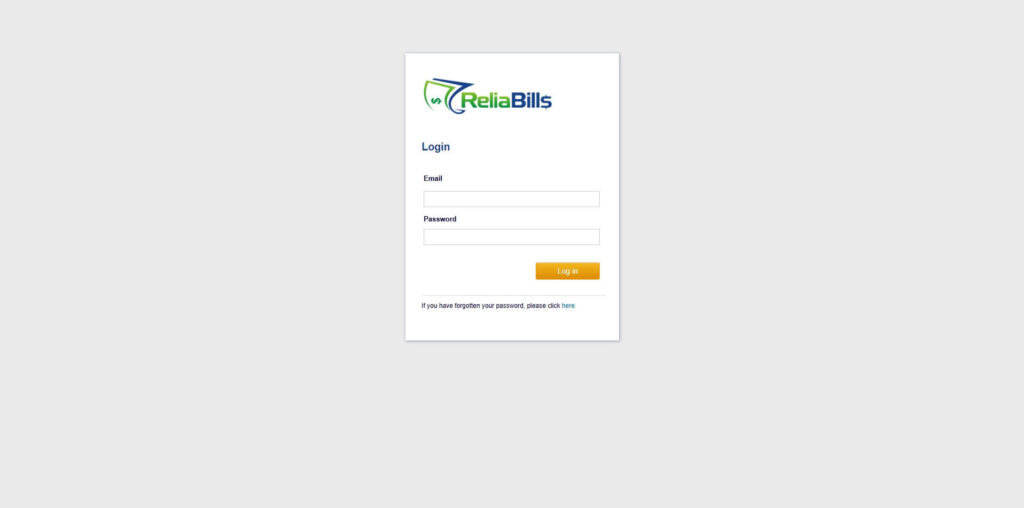
Step 2: Click on Invoices
- Navigate to the Invoices Dropdown and click on Invoices.
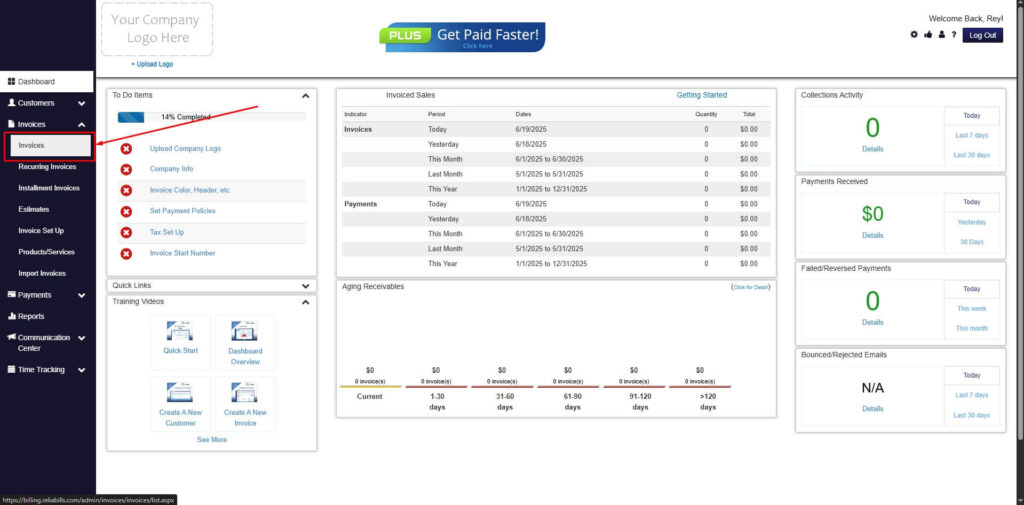
Step 3: Click ‘Create New Invoice’
- Click ‘Create New Invoice’ to proceed.
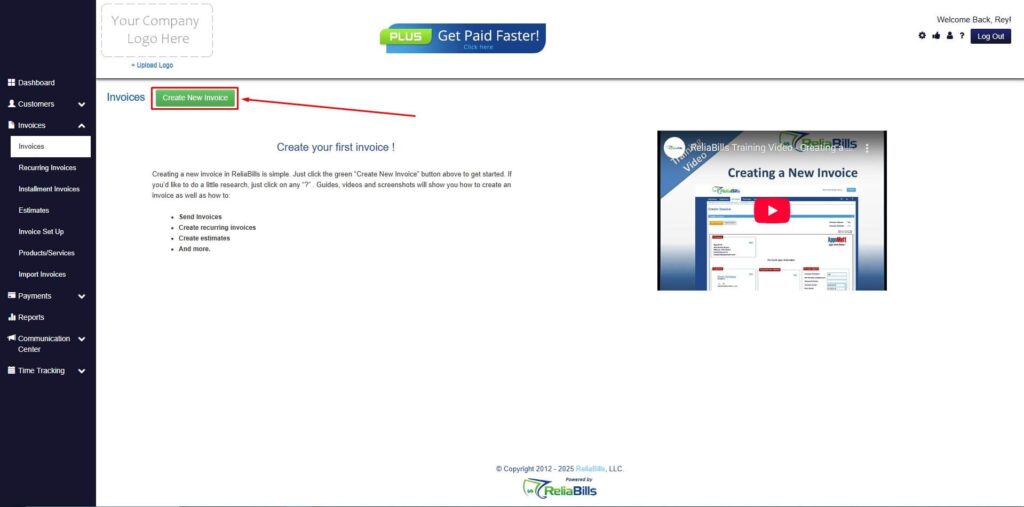
Step 4: Go to the ‘Customers Tab’
- If you have already created a customer, search for them in the Customers tab and make sure their status is “Active”.
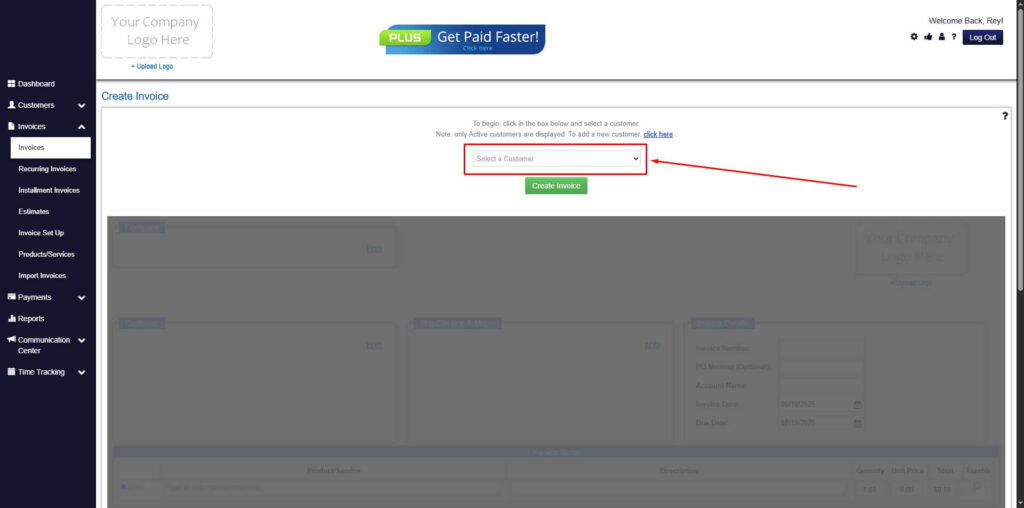
Step 5: Create Customer
- If you haven’t created any customers yet, click the ‘Click here’ to create a new customer.
- Provide the First Name, Last Name, and Email to proceed.
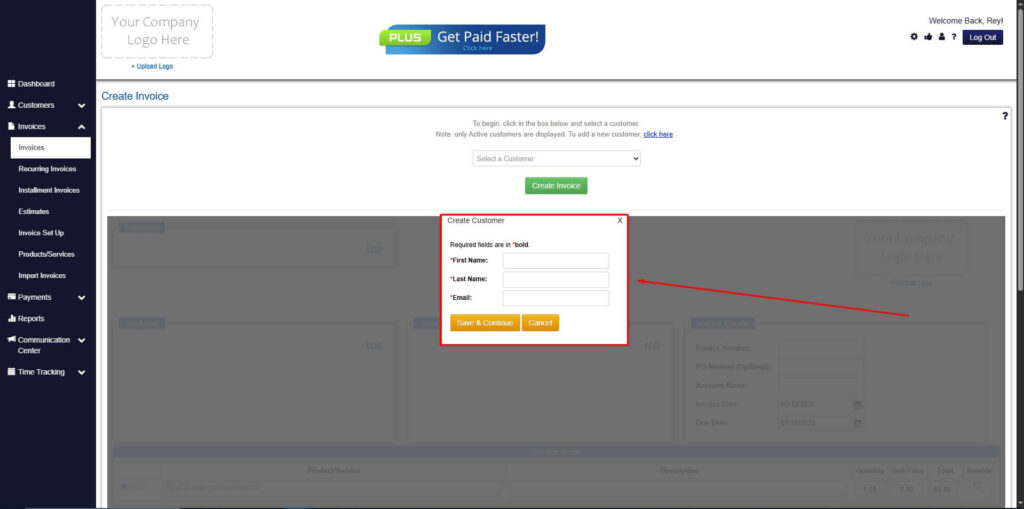
Step 6: Fill in the Create Invoice Form
- Fill in all the necessary fields.
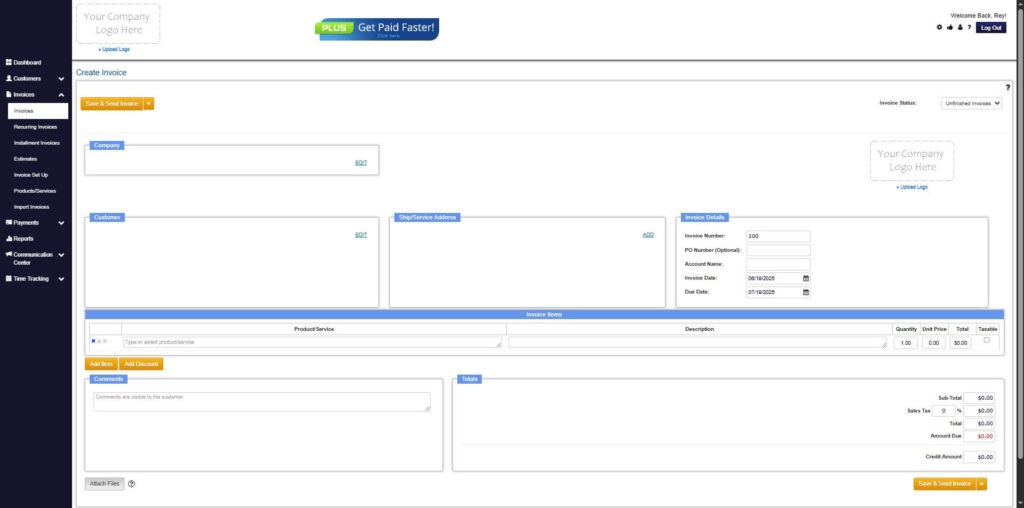
Step 7: Save Invoice
- After filling out the form, click “Save & Send Invoice” to continue.
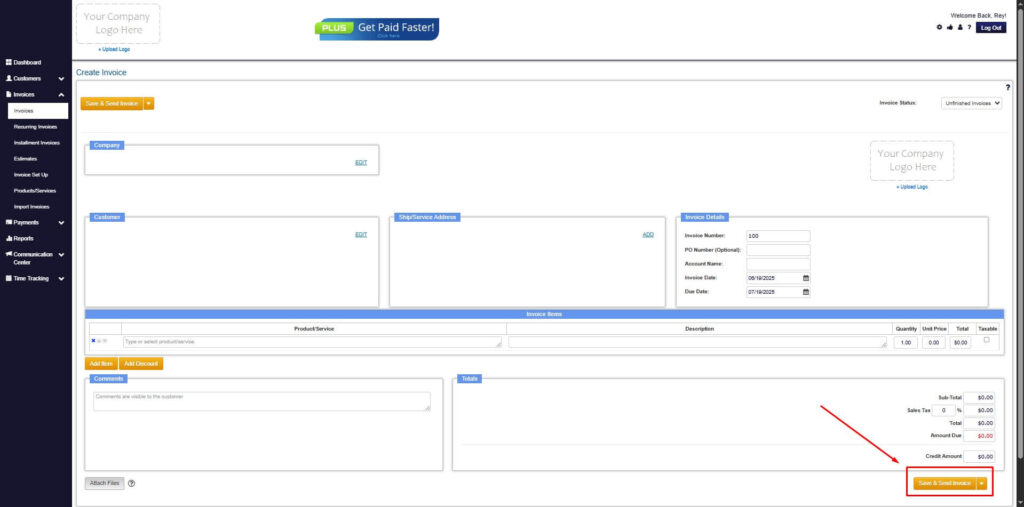
Step 8: Invoice Created
- Your Invoice has been created.
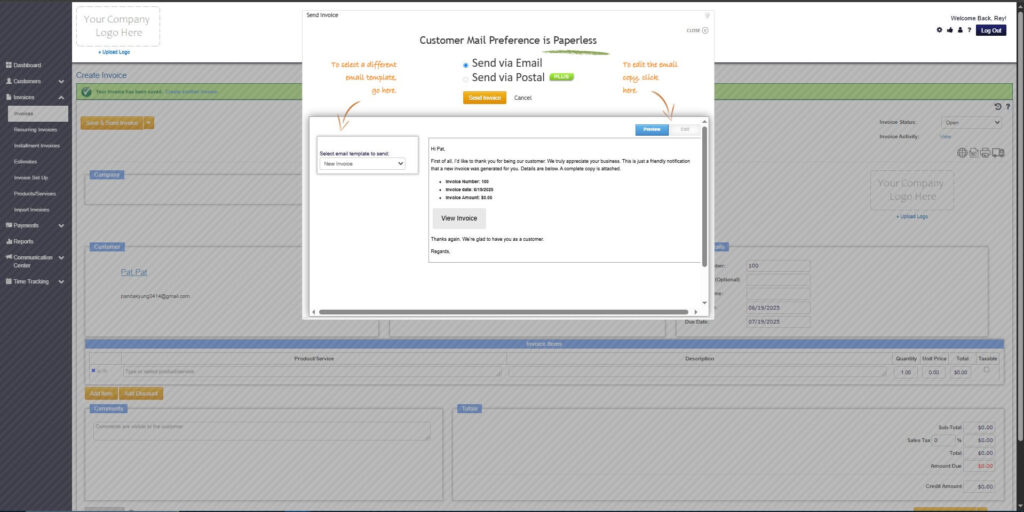
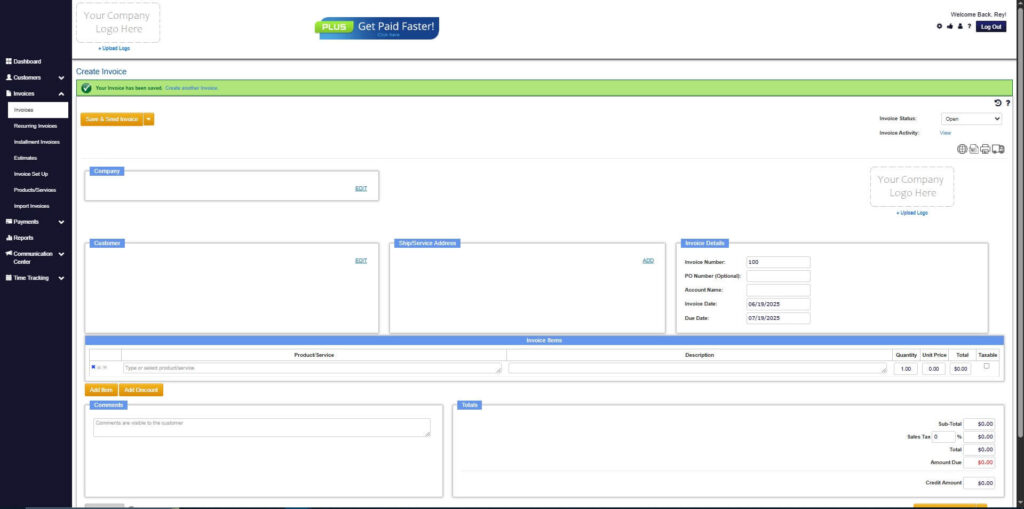
Conclusion
The threat of fake invoices is a pervasive concern that businesses of all sizes must remain vigilant against. We’ve explored several strategies to counter this menace, from implementing stringent invoice approval processes and utilizing technological advancements like blockchain and AI to reporting fraud promptly to the authorities and seeking legal recourse.
These actions are crucial for maintaining the integrity of your financial operations. While these measures provide substantial security, continuous vigilance is essential. Regularly review your financial transactions, educate your staff on the signs of invoice fraud, and verify the authenticity of invoices.
Safeguarding your business against fake invoices isn’t merely about protecting your financial resources—it’s about preserving the trust in your business, one invoice at a time.

